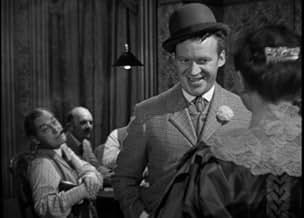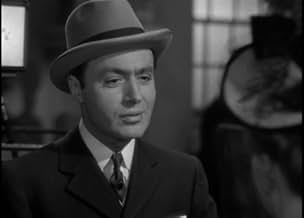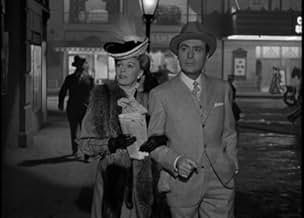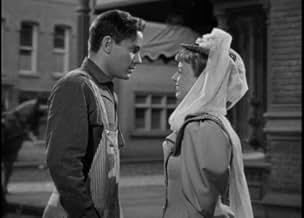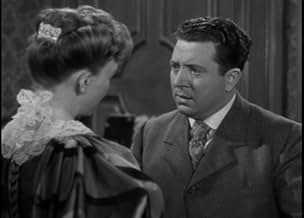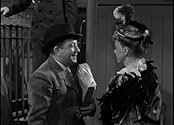AVALIAÇÃO DA IMDb
6,7/10
728
SUA AVALIAÇÃO
Adicionar um enredo no seu idiomaFive years after meeting and falling in love with a banker, a willful shop girl decides to become his mistress upon learning he has since gotten married and had a son.Five years after meeting and falling in love with a banker, a willful shop girl decides to become his mistress upon learning he has since gotten married and had a son.Five years after meeting and falling in love with a banker, a willful shop girl decides to become his mistress upon learning he has since gotten married and had a son.
- Direção
- Roteiristas
- Artistas
- Indicado a 1 Oscar
- 3 vitórias e 1 indicação no total
Eddie Acuff
- Andy
- (não creditado)
Dorothy Adams
- Mrs. Brown
- (não creditado)
William Alston
- Reporter
- (não creditado)
- Direção
- Roteiristas
- Elenco e equipe completos
- Produção, bilheteria e muito mais no IMDbPro
Avaliações em destaque
This second version of Back Street stars Margaret Sullavan as the Fannie Hurst
heroine who contents herself with being a mistress to a well known and rich
business executive. She has a few chances at marriage with others but this
woman won't settle for what she considers second best.
Margaret Sullavan had that tragic quality to her that made her cast so well in these parts. She had an unusual amount of screen deaths among her films like Three Comrades and No Sad Songs For Me. In this one she chooses what amounts to a living death with only moments of happiness.
It was a chance meeting at a railroad station that she meets up and coming business executive Charles Boyer. Boyer's French accent is explained by saying he was originally from New Orleans. Boyer too was born for romantic parts and he had just come off films like Algiers, Love Story, Hold Back The Dawn and All This And Heaven Too. Anoher player born for romance, happy or tragic.
It's a moment of capricious fate arranged by one of Sullavan's male acquaintances Frank Jenks that keeps them apart as she misses a riverboat that she was to leave on with Boyer. The next time they meet Boyer is married, but she agrees to be his mistress she loves him so.
Noting some other fine performances in this version are Esther Dale as Sullavan's stepmother, Frank McHugh as a traveling salesman who introduces Boyer and Sullavan, Richard Carlson as another male acquaintance whose proposal she turns down and who makes a fortune in the up and coming automobile business Samuel S. Hinds as Boyer's father-in-law.
Three of Hollywood's best actresses have played Ray Smith. In order Irene Dunne, Margaret Sullavan and Susan Hayward. Who was best in the role who can say. But I wouldn't want to bet money on a contest poll on any of them. Ray Smith is a choice female role and three choice players have done it.
Margaret Sullavan had that tragic quality to her that made her cast so well in these parts. She had an unusual amount of screen deaths among her films like Three Comrades and No Sad Songs For Me. In this one she chooses what amounts to a living death with only moments of happiness.
It was a chance meeting at a railroad station that she meets up and coming business executive Charles Boyer. Boyer's French accent is explained by saying he was originally from New Orleans. Boyer too was born for romantic parts and he had just come off films like Algiers, Love Story, Hold Back The Dawn and All This And Heaven Too. Anoher player born for romance, happy or tragic.
It's a moment of capricious fate arranged by one of Sullavan's male acquaintances Frank Jenks that keeps them apart as she misses a riverboat that she was to leave on with Boyer. The next time they meet Boyer is married, but she agrees to be his mistress she loves him so.
Noting some other fine performances in this version are Esther Dale as Sullavan's stepmother, Frank McHugh as a traveling salesman who introduces Boyer and Sullavan, Richard Carlson as another male acquaintance whose proposal she turns down and who makes a fortune in the up and coming automobile business Samuel S. Hinds as Boyer's father-in-law.
Three of Hollywood's best actresses have played Ray Smith. In order Irene Dunne, Margaret Sullavan and Susan Hayward. Who was best in the role who can say. But I wouldn't want to bet money on a contest poll on any of them. Ray Smith is a choice female role and three choice players have done it.
"This film (based on a Fanny Hurst best seller) is way out of date in the modern age. No self-respecting woman would be so willing to sacrifice her career for the prospect of being a millionaire's kept woman. No man, seriously in love with any woman, would put them through such a demeaning situation (they would consider divorce first of all, then remarriage). But there was supposed to be a sense of self-sacrifice by the heroine (Margaret Sullivan) that transcended the entire story."
The point is, this film isn't set in the modern age. There's no sense judging this or any other movie set in another era by today's standards. At the time this story took place, divorce wasn't common. In fact, it was still considered scandalous. Many women put up with unhappy, even abusive marriages, rather than incur the wrath of society that a divorce would have brought upon them. Also, regardless of what her career prospects may have been, a man's career always took precedence. There's no way that he would have sacrificed his family and his career in order to divorce his wife and marry his mistress. There's no way she would have asked him to. This was made very clear in a conversation that took place between them.
When you watch a movie set in another time you need to keep in mind that the rules that governed society are most likely far different than the ones we have today. You need to judge it by those rules or not at all.
The point is, this film isn't set in the modern age. There's no sense judging this or any other movie set in another era by today's standards. At the time this story took place, divorce wasn't common. In fact, it was still considered scandalous. Many women put up with unhappy, even abusive marriages, rather than incur the wrath of society that a divorce would have brought upon them. Also, regardless of what her career prospects may have been, a man's career always took precedence. There's no way that he would have sacrificed his family and his career in order to divorce his wife and marry his mistress. There's no way she would have asked him to. This was made very clear in a conversation that took place between them.
When you watch a movie set in another time you need to keep in mind that the rules that governed society are most likely far different than the ones we have today. You need to judge it by those rules or not at all.
This is the second of the thrice filmed Fanny Hurst novel about the other woman. Tastefully directed and lensed by Robert Stephenson and Charles Daniels and featuring standout performances from Charles Boyer and Margaret Sullavan it is probably the best of the bunch.
Traveling salesman Walter Saxel and free spirit Ray Smith meet through an acquaintance and in the course of an evening become strongly attracted to each other. He is engaged but makes a decision to marry her on board a river boat. She unfortunately misses the boat and Saxel doesn't see her for another five years marrying in the meantime. They rekindle and she becomes his mistress. As he grows in fame and fortune she remains in the shadow for decades until his children confront her.
Boyer and Sullavan as the long time lovers display a wonderful chemistry with each other. Sullavan's husky voice and Boyer's suave inflection reinforced by telling glances unite the two in an odd but perfect romantic match. Richard Carlson as a well intentioned suitor is also well cast and Frank McHugh, allowed to stretch, shines as Ray's loyal friend with an eternal crush.
Director Stephenson does an excellent job of keeping mood subdued without resorting to hysterics to bring life to the story. His adults behaving like adults expressing and suppressing their feelings in a tempered but passionate way gives the film a graceful tension. Cinematographer Charles Daniels turns in his usual array of impeccably lit compositions such as an evening snowfall where Ray and Walter meet for the first time in five years and the powerful final moments that he along with Stephens jarring and effectively de-romanticizes with stunning portraiture that evokes Goya.
Traveling salesman Walter Saxel and free spirit Ray Smith meet through an acquaintance and in the course of an evening become strongly attracted to each other. He is engaged but makes a decision to marry her on board a river boat. She unfortunately misses the boat and Saxel doesn't see her for another five years marrying in the meantime. They rekindle and she becomes his mistress. As he grows in fame and fortune she remains in the shadow for decades until his children confront her.
Boyer and Sullavan as the long time lovers display a wonderful chemistry with each other. Sullavan's husky voice and Boyer's suave inflection reinforced by telling glances unite the two in an odd but perfect romantic match. Richard Carlson as a well intentioned suitor is also well cast and Frank McHugh, allowed to stretch, shines as Ray's loyal friend with an eternal crush.
Director Stephenson does an excellent job of keeping mood subdued without resorting to hysterics to bring life to the story. His adults behaving like adults expressing and suppressing their feelings in a tempered but passionate way gives the film a graceful tension. Cinematographer Charles Daniels turns in his usual array of impeccably lit compositions such as an evening snowfall where Ray and Walter meet for the first time in five years and the powerful final moments that he along with Stephens jarring and effectively de-romanticizes with stunning portraiture that evokes Goya.
Two of Hollywood's greatest actors, Charles Boyer and Margaret Sullavan, starred in this first remake of the 30s tearjerker, and they
portrayed the star-crossed lovers with great restraint. Acting, writing and direction all combined to create the ultimate BACK STREET! Warners had their crime dramas, MGM had their musicals, Paramount had their comedies, and Universal had the best weepers. This may be the very best one ever! Even the supporting cast was hand-picked with care. Richard Carlson, ever the "other guy", does his thing once more, and we want him to win for a change, but in this case, true love ruins all. Frank McHugh, as Rae's friend, gives perhaps his best performance.
portrayed the star-crossed lovers with great restraint. Acting, writing and direction all combined to create the ultimate BACK STREET! Warners had their crime dramas, MGM had their musicals, Paramount had their comedies, and Universal had the best weepers. This may be the very best one ever! Even the supporting cast was hand-picked with care. Richard Carlson, ever the "other guy", does his thing once more, and we want him to win for a change, but in this case, true love ruins all. Frank McHugh, as Rae's friend, gives perhaps his best performance.
Margaret Sullavan is one of my all-time favorite actresses with her husky voice and haunting screen presence. The original version in 1932 with Irene Dunne and John Boles was dull and stage-bound; the later version with Susan Hayward was just too gaudy. This is the version to watch!
Margaret gives an exquisitely heart-rending performance as a turn-of-the-century miss who falls in love with a man (played by the smooth but oh-so-serious Charles Boyer). Fate intervenes and the two lovers are separated. They meet again years later, but, true to the classic weeper formula, he is married. Despite her better judgment, she carries on a "Back Street" romance with him for many years until their untimely demises.
Promoted with the tag line, "If you have tears, be prepared to shed them", this movie does involve some suspension of disbelief. For example, for such a level-headed gal, why does Margaret allow Boyer to treat her so shabbily? Just when I am about to shake my head and yell "Why?", Margaret then either let loose with the tears or try to hide the choking sob in her voice, and I'm transfixed all over again.
This film does feature solid direction, beautiful photography and some good supporting performances (I particularly liked Frank McHugh in this one). This film remains on my "Wish-They-Release-This-One-on-Video" list.
Margaret gives an exquisitely heart-rending performance as a turn-of-the-century miss who falls in love with a man (played by the smooth but oh-so-serious Charles Boyer). Fate intervenes and the two lovers are separated. They meet again years later, but, true to the classic weeper formula, he is married. Despite her better judgment, she carries on a "Back Street" romance with him for many years until their untimely demises.
Promoted with the tag line, "If you have tears, be prepared to shed them", this movie does involve some suspension of disbelief. For example, for such a level-headed gal, why does Margaret allow Boyer to treat her so shabbily? Just when I am about to shake my head and yell "Why?", Margaret then either let loose with the tears or try to hide the choking sob in her voice, and I'm transfixed all over again.
This film does feature solid direction, beautiful photography and some good supporting performances (I particularly liked Frank McHugh in this one). This film remains on my "Wish-They-Release-This-One-on-Video" list.
Você sabia?
- CuriosidadesA contemporary article in the Los Angeles Examiner stated Joan Fontaine was originally cast in the female lead, but she was replaced by Margaret Sullavan before shooting began.
- Erros de gravaçãoIn the closing sequences, which are supposed to be taking place in 1928, all of the women's hair styles and clothes, particularly those of Nell O'Day, and especially Margaret Sullavan's square-shouldered fur cape, are strictly contemporary 1941.
- ConexõesFeatured in The Universal Story (1996)
- Trilhas sonorasAuld Lang Syne
(uncredited)
Traditional Scottish music
Lyrics by Robert Burns
Sung by New Year's Eve party revellers
Principais escolhas
Faça login para avaliar e ver a lista de recomendações personalizadas
- How long is Back Street?Fornecido pela Alexa
Detalhes
- Data de lançamento
- País de origem
- Idioma
- Também conhecido como
- Back Street
- Locações de filme
- Empresa de produção
- Consulte mais créditos da empresa na IMDbPro
- Tempo de duração
- 1 h 29 min(89 min)
- Cor
- Proporção
- 1.37 : 1
Contribua para esta página
Sugerir uma alteração ou adicionar conteúdo ausente


